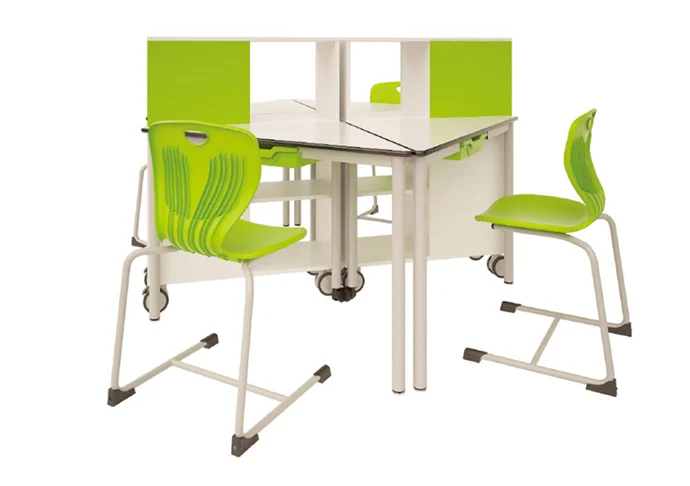Why Modular Desks for School Classrooms Are the Future of Learning
多行文本内容元素
富文本内容绑定数据后可解析HTML语言内容
Release time:
Jul 16,2025
Summary:Why Modular Desks for School Classrooms Are the Future of Learning
Introduction: The Changing Face of Education
In today’s rapidly evolving educational landscape, traditional classroom setups are becoming increasingly outdated. With the mounting evidence that flexible learning environments enhance student engagement and academic achievement, **modular desks for school classrooms** are emerging a
Why Modular Desks for School Classrooms Are the Future of Learning
Introduction: The Changing Face of Education
In today’s rapidly evolving educational landscape, traditional classroom setups are becoming increasingly outdated. With the mounting evidence that flexible learning environments enhance student engagement and academic achievement, **modular desks for school classrooms** are emerging as a pivotal solution. This article delves into why modular desks are not just a trend but rather the future of learning.
Understanding Modular Desks: The Basics
Before we explore the numerous advantages of modular desks, it’s essential to understand what they are. **Modular desks** are versatile furniture pieces that can be easily reconfigured to suit various instructional styles and classroom activities. Unlike traditional fixed desks, modular designs allow for:
- **Flexibility**: Easy arrangement to foster collaboration.
- **Scalability**: Adaptable to different classroom sizes.
- **Personalization**: Tailored to meet the unique needs of students.
Key Features of Modular Desks
Modular desks come with several features that enhance their functionality, which include:
1. Adjustable Height
Many modular desks can be adjusted to accommodate students of varying heights. This feature promotes comfort and proper posture, essential for long hours of study.
2. Collaborative Designs
These desks often come in shapes that encourage teamwork, such as circular or triangular arrangements. This design promotes cooperative learning and peer interaction.
3. Integrated Technology
With the rise of digital learning, modular desks often include built-in power outlets and charging stations for laptops and tablets, facilitating a seamless blend of traditional and digital education.
The Benefits of Modular Desks in Classrooms
Implementing modular desks in school classrooms offers numerous benefits, transforming the learning experience for students and teachers alike.
1. Enhanced Collaboration and Teamwork
**Modular desks** are designed to promote group work and collaboration. By easily rearranging desks, teachers can create dynamic learning spaces that foster discussion and teamwork among students. This change in layout encourages students to communicate, share ideas, and learn from one another.
2. Increased Engagement and Participation
Flexibility in seating arrangements significantly boosts student engagement. When students can choose their seating based on the activity, they feel more invested in their learning experience. The ability to easily shift between individual work, group projects, and discussions keeps the classroom environment lively and interactive.
3. Adaptability to Different Learning Styles
Every student learns differently. Modular desks allow teachers to create personalized learning experiences that cater to diverse learning styles. Whether through group activities, solo tasks, or hands-on projects, the adaptability of modular desks supports various pedagogical approaches.
4. Optimized Space Utilization
In many educational institutions, space is at a premium. Modular desks can be configured in numerous ways to maximize the use of available classroom space. This optimization ensures that every square foot is utilized effectively, providing a more conducive learning environment.
Designing the Perfect Classroom with Modular Desks
When it comes to creating an effective learning environment, the arrangement and design of modular desks are crucial. Here are some tips for designing classrooms using modular desks:
1. Create Zones for Different Activities
Designate specific areas within the classroom for various types of learning activities. For instance, one zone can be for collaborative work, while another can be a quiet area for individual tasks. This zoning helps students understand the purpose of each space and encourages them to engage accordingly.
2. Encourage Movement and Flexibility
Incorporate the idea of movement in the classroom by arranging desks in a way that allows for easy transitions between activities. Students should feel comfortable moving around, rearranging their desks as needed, and collaborating with their classmates.
3. Incorporate Technology Seamlessly
Ensure that the classroom is equipped with the necessary technology to enhance learning. Modular desks with integrated tech features can facilitate seamless access to digital resources, fostering an engaging and modern educational experience.
Challenges and Considerations
While the benefits of modular desks are evident, there are challenges and considerations that schools must address when implementing them.
1. Budget Constraints
Investing in modular desks can be costly, especially for underfunded school districts. However, the long-term benefits of improved student engagement and learning outcomes may justify the initial investment.
2. Training for Educators
Teachers must be trained to utilize the flexibility of modular desks effectively. Professional development programs should be established to help educators adapt their teaching styles and classroom management strategies to maximize the benefits of modular furniture.
3. Maintenance and Durability
Schools should consider the durability and maintenance of modular desks. Investing in high-quality materials is essential to ensure that the furniture withstands daily use and remains functional over time.
Case Studies: Successful Implementation of Modular Desks
Many schools across the globe have already embraced modular desks, showcasing their effectiveness in enhancing the educational environment.
1. Innovative Learning Spaces at XYZ High School
XYZ High School restructured its classrooms using modular desks, resulting in a 20% increase in student participation rates. The flexible layout allowed teachers to implement various teaching strategies, leading to improved academic performance.
2. The Shift at ABC Elementary
ABC Elementary School adopted modular desks to create an interactive learning environment. Teachers reported increased collaboration among students and a noticeable boost in engagement during group projects.
The Future of Modular Desks in Education
As education continues to evolve, the demand for adaptable, student-centered learning environments will grow. Modular desks represent a significant step toward this future. With advancements in technology and design, we expect to see an even broader range of modular furniture options that cater to the changing needs of students and educators alike.
FAQs About Modular Desks for School Classrooms
1. What are the main advantages of modular desks in classrooms?
Modular desks enhance collaboration, increase student engagement, adapt to different learning styles, and optimize space utilization.
2. How can modular desks support different teaching styles?
They can be easily rearranged for group work, individual study, or hands-on activities, allowing teachers to implement various pedagogical approaches.
3. Are modular desks suitable for all age groups?
Yes, modular desks can be designed to accommodate different age groups and sizes, ensuring comfort and ergonomics.
4. How do schools typically fund the purchase of modular desks?
Funding can come from various sources, including school budgets, grants, and fundraising efforts. The long-term benefits often justify the initial costs.
5. What should schools consider when selecting modular desks?
Schools should evaluate durability, maintenance requirements, budget constraints, and the specific needs of their students and teaching staff.
Conclusion: Embracing the Future of Learning
In conclusion, **modular desks** represent a transformative approach to classroom design that addresses the evolving needs of students and educators. By enhancing collaboration, engagement, and adaptability, modular desks are not merely a trend but a fundamental shift in how we view learning environments. As more schools recognize the benefits of this innovative furniture, we can expect a brighter, more interactive future for education. Embracing modular desks will certainly pave the way for more effective teaching and improved student outcomes, solidifying their place as the future of learning.


